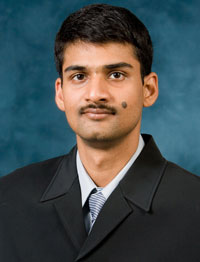 ME Assistant Professor Vikram Gavini has received a 2011 National Science Foundation CAREER award, NSF’s most prestigious awards for new faculty members.
ME Assistant Professor Vikram Gavini has received a 2011 National Science Foundation CAREER award, NSF’s most prestigious awards for new faculty members.
Gavini was selected by the NSF Division of Civil, Mechanical, and Manufacturing Innovation for his proposal, “Bridging Quantum-Mechanics with Mechanics: Towards Predictive Computations of Materials Behavior.”
The abstract reads, “The objective of this Faculty Early Career Development (CAREER) Program award is to develop a seamless multi-scale computational technique to study crystalline solids with defects by resolving all the relevant length-scales—from quantum-mechanical interactions at the sub-Angstrom length-scale to the elastic fields on the continuum scale. This will be achieved by (i) developing a real-space finite-element formulation of Kohn-Sham Density Functional Theory (KSDFT) which will scale linearly with the number of electrons; and (ii) developing the quasi-continuum reduction of KSDFT using a hierarchy of adaptive finite-element triangulations which will resolve the quantum-mechanical interactions where necessary (like the core of a defect), while seamlessly coarse-graining away to capture the long-ranged elastic fields. The developed multi-scale scheme will be used to investigate the origins of plasticity in surface dominated structures like nano-pillars.
The proposed research will enable quantum-mechanics informed calculations on continuum scales by seamlessly bridging the quantum-mechanical length-scale with the continuum. Importantly, this multi-scale scheme links the material description at any length-scale to their fundamental origin — the electronic structure. Thus, the developed method is expected to be transferable and predictive. This effort will enable an accurate quantum-mechanical description of defects in materials, and in effect will promote predictive simulations of deformation and failure mechanisms in solids. The educational efforts include developing a core-curriculum for the field of nanoscience, and developing educational modules involving simulations of materials behavior to demonstrate the importance of computations in science and technology to high school students.”
See also Award Abstract
